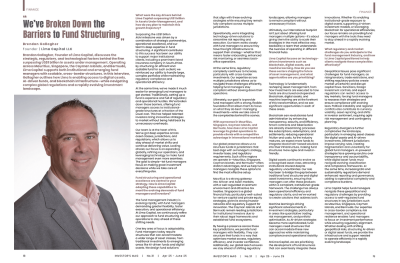In a recent feature on Investor’s Mag, Carli Purchase, Investment Analyst shares the key principles and techniques to optimise your fund management processes.
The fast-paced and competitive world of fund management demands relentless pursuit of operational excellence. With mounting pressure to deliver strong returns to investors while navigating complex financial markets, fund managers simply cannot afford to overlook the importance of optimising their operational framework.
Operational excellence in fund management goes beyond efficiency and cost control; it encompasses a holistic approach to streamlining operations, automating manual tasks, and enhancing overall productivity. By implementing best practices and leveraging technology, fund managers can improve trading execution, risk reduction, and enhance compliance.
A culture of operational excellence, not only improves internal efficiency but also instils trust and confidence in investors. Investors are more likely to entrust their capital and investments to a fund manager who has robust operational processes in place.
The Role of Operational Excellence in Improving Fund Performance
A manager cannot feasibly handle all middle and back-office tasks while making sound investment decisions. However, understanding the fund’s operations is crucial. Outsourcing to reputable service providers can significantly contribute to creating efficient workflows, but the fund manager must oversee the entire process. Technology is vital here, as it can minimise errors and reduce administrative costs. Start-up managers should plan their operational workflow in advance, aiming for efficiency from idea generation to NAV reporting.
Moreover, a well-structured investment process that emphasises efficiency and accountability provides a competitive advantage. Streamlined communication and centralised record-keeping reduce errors and free up time for investment decisions. By integrating these practices, fund managers can maintain a sharp focus on their investment strategies while ensuring operational robustness.
Key Principles of Operational Excellence in Fund Management
Achieving operational excellence in fund management involves adhering to several key principles. These principles ensure that fund operations are efficient, compliant, and scalable, ultimately leading to better performance and increased investor trust.
- Regulatory Compliance: Adhering to all legal and regulatory requirements ensures that funds operate within the law, reducing the risk of penalties and fostering investor trust.
- Operational Scalability: Implementing processes that can adapt and grow with the fund’s needs helps maintain efficiency as the fund expands.
- Risk Management: Proactively identifying and mitigating risks protects the fund’s assets and ensures stable performance.
- Transparent Reporting: Providing clear and comprehensive reports to investors fosters trust and supports informed decision-making.
- Continuous Improvement: Embracing a culture of ongoing assessment and enhancement of processes ensures the fund remains competitive and efficient.
Benefits of Implementing Operational Excellence in Fund Management
Implementing operational excellence in fund management enhances efficiency by streamlining operations and reducing manual errors, which lowers operational costs and improves net returns. Robust compliance processes ensure adherence to regulatory standards, mitigating legal risks. Advanced risk management protects fund assets, while transparent reporting fosters investor confidence. Overall, operational excellence positions fund managers to outperform competitors through better returns, increased productivity, and efficient management, attracting and retaining investors.
Techniques for Achieving Operational Excellence in Fund Management
Achieving operational excellence in fund management requires the effective practices that enhance efficiency, compliance, and performance.
Best Practices:
- Efficient Jurisdiction Selection: Choosing optimal jurisdictions for fund registration to enhance tax efficiency and regulatory compliance.
- Centralised Compliance Oversight: Conducting regular internal audits and continuous monitoring to ensure adherence to all relevant regulations without the need for multiple software solutions.
- Transparent Investor Reporting: Providing clear and comprehensive reports to investors, fostering trust and supporting informed decision-making.
- Scalable Infrastructure: Developing processes and systems that can grow with the fund, maintaining efficiency as assets under management increase.
- Continuous Improvement: Fostering a culture of ongoing assessment and enhancement of processes, integrating feedback, and staying updated with industry best practices.
The Future of Operational Excellence in Fund Management
As the financial landscape continues to evolve, the importance of operational excellence in fund management will only grow. Future advancements will likely focus on further integrating artificial intelligence and machine learning to enhance predictive analytics and decision-making processes. Blockchain technology could revolutionise transparency and security in fund transactions. Additionally, environmental, social, and governance (ESG) criteria will become more embedded in operational practices, reflecting investor priorities. By staying ahead of technological trends and maintaining a commitment to continuous improvement, fund managers can ensure they remain competitive and capable of delivering superior returns and robust risk management in the years to come.








